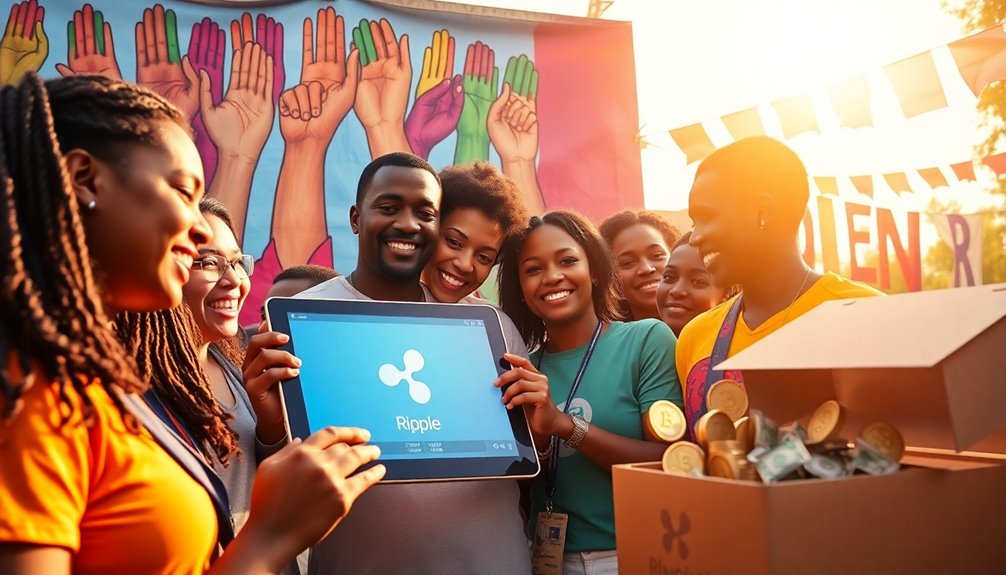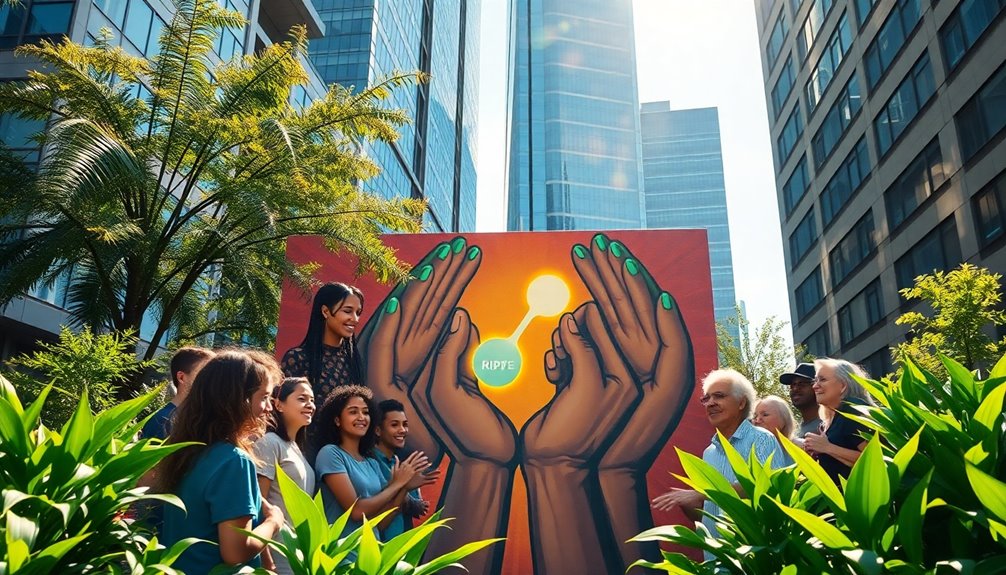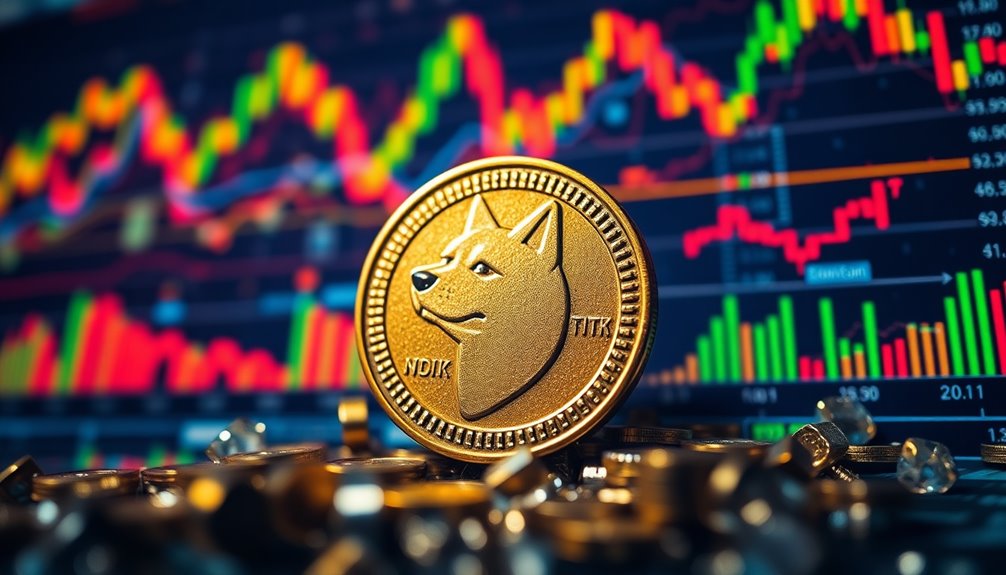Ripple's game-changing pledge is reshaping the world of cryptocurrency by committing to social good. You've got the chance to witness how they donate 1% of profits, contributing $180 million to global initiatives since 2018. Their focus on financial inclusion and sustainability is impressive, pushing for carbon neutrality by 2030 while enhancing aid distribution through blockchain technology. Ripple not only empowers communities but also actively engages employees in giving programs. This bold commitment proves that crypto can drive real change. Want to discover how these efforts reshape financial landscapes and humanitarian aid? There's much more to explore!
Key Takeaways
- Ripple has committed to donating 1% of profits through the Pledge 1% initiative, contributing $180 million to global social initiatives since 2018.
- The company focuses on financial inclusion, addressing the needs of 1.4 billion adults lacking basic financial tools through blockchain technology.
- Ripple invests in humanitarian aid, utilizing blockchain for transparent aid distribution and providing $1 million to improve cross-border payment solutions.
- Their commitment to sustainability includes a goal for carbon neutrality by 2030, alongside eco-friendly practices in operations and data centers.
- Employee engagement is encouraged through 100% donation matching and active participation in volunteering, achieving 78% involvement in social good initiatives.
Ripple's Philanthropic Commitment

Joining the Pledge 1% initiative, Ripple's philanthropic commitment underscores its dedication to charitable giving. By pledging to donate 1% of its profits, Ripple aligns itself with a movement that's already seen nearly 18,000 companies from over 130 countries contribute billions to various causes. Established in 2014, this initiative promotes corporate philanthropy and celebrates its 10-year anniversary with a significant milestone, such as ringing the Nasdaq closing bell. Ripple's commitment to the initiative demonstrates its belief in the importance of corporate giving as a means to foster social impact.
Ripple focuses its charitable efforts on enhancing financial inclusion and advancing blockchain innovation. Since 2018, it has donated $180 million to global initiatives, demonstrating a broad philanthropic scope that extends beyond just financial services. Ripple actively engages with communities, supporting educational and developmental projects while providing essential resources and training for developers. Additionally, its focus on self-acceptance helps encourage individuals to embrace innovative solutions and opportunities for growth.
Through its commitment, Ripple not only fosters innovation within the blockchain space but also empowers communities by championing various causes. By prioritizing charitable giving, you see how Ripple sets a powerful example for other companies in the tech sector, proving that success can indeed go hand in hand with a commitment to doing good.
Driving Sustainability in Blockchain

Ripple's commitment to driving sustainability in blockchain is paving the way for a greener future. By focusing on eco-friendly practices, you can see their impact in several key areas:
- Carbon Offsetting: Ripple invests in reforestation and renewable energy projects, working to neutralize its carbon footprint and aiming for carbon neutrality by 2030. Regular performance audits ensure that their sustainability initiatives are effective and impactful.
- Energy Efficiency: They're continuously optimizing their infrastructure, adopting energy-saving technologies, and utilizing renewable energy sources in their data centers. This reduces overall energy consumption considerably.
- Sustainable Partnerships: Ripple collaborates with organizations that share its sustainability goals, promoting industry-wide adoption of eco-friendly practices and supporting the development of carbon credit tokenization on the XRP Ledger.
Engaging Employees in Social Good

Engagement in social good is an essential aspect of creating a positive workplace culture. At Ripple, you're not just an employee; you're part of a community dedicated to making a difference. The company offers 100% donation matching up to $1,000 per year, and during crises, this increases to 200%. By participating in local nonprofit partnerships, you get the chance to volunteer while also building team camaraderie. Engaging in social good can also enhance emotional regulation, which is crucial for managing stress and fostering a supportive work environment. Additionally, engaging in social good can lead to improved personalized learning pathways for employees, as they gain new skills and perspectives through diverse experiences. Furthermore, engaging in social good can inspire diversified crypto assets within the workplace, promoting innovative thinking and collaboration.
Ripple's commitment extends to global humanitarian efforts, like the $1 million donated for earthquake relief in Turkey and Syria. You're encouraged to join these initiatives, making your involvement a key metric for the employee impact program. Volunteering events not only enrich your experience but also enhance your skills through long-term skill-sharing opportunities. Furthermore, Ripple has achieved 78% employee participation in giving and volunteering programs, showing a strong culture of engagement.
Additionally, Ripple fosters a culture of giving by matching donations for causes like the Maui Emergency Response Fund and supporting NGOs in Ukraine. With strategic partnerships and blockchain technology ensuring transparency, you can trust that your efforts contribute to meaningful change. By engaging in social good, you're not only helping others but also cultivating a fulfilling work environment for yourself and your colleagues.
Blockchain Innovations for Inclusion

Blockchain innovations are reshaping how we think about financial resilience, humanitarian aid, and inclusive payment systems. You'll see how these technologies offer secure and efficient solutions for those traditionally left out of the financial system. By embracing these advancements, we can create a more equitable world for everyone. Moreover, addressing the challenge that 1.4 billion adults globally lack basic financial tools is crucial for enhancing financial inclusion. Implementing solutions such as retirement savings plans can further empower marginalized communities to build long-term financial security. Additionally, understanding investment strategies is vital for individuals looking to optimize their financial growth in an evolving market.
Financial Resilience Initiatives
In today's rapidly evolving financial landscape, innovative approaches are essential for enhancing financial resilience and inclusion. Ripple's initiatives are paving the way for a more inclusive financial system, primarily through the following strategies:
- Decentralized Access: Blockchain technologies allow you to access financial services even in areas where traditional banking is lacking, making it easier for everyone to participate in the economy.
- Cost Reduction: By minimizing intermediaries, blockchain considerably lowers transaction costs. This is particularly beneficial for low-income individuals who can now afford essential financial services.
- Empowering Startups: Ripple's partnership with Mercy Corps Ventures supports early-stage startups using the XRP Ledger and RLUSD stablecoin, providing grants that fuel innovation in remittances, savings, and micropayments. This collaboration aligns with Ripple's commitment of over $5.5 million to support underserved communities, ensuring that entrepreneurs have the resources they need to thrive.
These initiatives not only democratize financial access but also promote data integrity and transparency. By leveraging blockchain's decentralized nature, Ripple is fostering a collaborative ecosystem that enhances financial literacy and participation. As these innovations unfold, they're set to redefine how you engage with financial systems, making them more resilient and inclusive for everyone.
Humanitarian Aid Solutions
Ripple's commitment to fostering financial resilience naturally extends to humanitarian aid solutions, where innovative technologies make a significant impact. By leveraging blockchain, Ripple can increase efficiency, transparency, and accountability in aid distribution. This technology allows real-time data sharing between aid agencies and facilitates direct aid to those who need it most. As part of this initiative, Ripple has partnered with the International Rescue Committee to explore cross-border payment solutions that enhance cash relief programs. Air quality is a critical factor that can affect the health and well-being of vulnerable populations, making timely aid delivery even more crucial. Additionally, understanding personal debt forgiveness bills can further support those affected by crises as they recover financially. Furthermore, energy-efficient heat pumps can play a role in providing comfort and safety in temporary housing for displaced individuals.
To illustrate these innovations, here's a breakdown of key benefits:
| Benefit | Description |
|---|---|
| Increases Efficiency | Enhances coordination among stakeholders for quicker aid distribution. |
| Improves Transparency | Provides a tamper-proof ledger for real-time recording of aid transactions. |
| Streamlines Cash Aid | Reduces logistical bottlenecks and minimizes aid misappropriation. |
| Enhances Accountability | Records all transactions, lowering the risk of corruption. |
| Facilitates Direct Aid | Guarantees aid reaches victims directly, bypassing intermediaries. |
Through its partnership with the International Rescue Committee, Ripple aims to explore cross-border solutions that enhance cash relief programs. By doing so, you can help guarantee that humanitarian efforts not only scale but also become more effective in meeting urgent needs. Blockchain's potential in humanitarian aid truly represents a game-changing commitment to doing good.
Inclusive Payment Systems
Imagine a world where everyone has access to essential financial services, regardless of their background or location. With blockchain technology, this dream is becoming a reality for over 1.4 billion unbanked adults. Here's how inclusive payment systems are transforming lives:
- Mobile Accessibility: Cryptocurrencies and DeFi platforms offer alternative finance options accessible via mobile phones, making financial services available even in remote areas. The rise of digital wallets has significantly contributed to the accessibility of these services. The integration of STEM toys for children can also enhance financial literacy from a young age. Furthermore, mobile payment systems have streamlined transactions, encouraging greater participation in the economy.
- Digital Identities: Blockchain solutions provide secure, portable digital identities, enabling people without traditional IDs to access crucial banking services. Blockchain solutions help fill gaps for underserved populations
- Economic Empowerment: Digital wallets enhance economic opportunities in underserved communities, allowing participation in e-commerce and improving financial literacy.
These innovations fill gaps left by traditional banks, which often overlook marginalized populations due to high costs and lack of trust. By integrating blockchain with existing financial systems, we can create a more inclusive digital economy. This approach not only addresses the challenges of limited financial infrastructure but also fosters equality and diversity. Through these advancements, you can help pave the way for a future where everyone has the chance to thrive financially.
Ripple's Market Impact and Growth

The surge in XRP's price and market presence has created a buzz in the cryptocurrency space, capturing the attention of both retail and institutional investors. As of early December 2024, XRP's price skyrocketed to $2.35, marking a remarkable 341% increase since November. This surge has reinstated XRP as the third-largest digital asset by market capitalization, surpassing competitors like Solana and Binance's BNB. Recent legal victories for Ripple have added to the excitement, driving positive investor sentiment and market momentum. Google Trends data reveals that searches for "XRP" have outpaced broader crypto terms, highlighting its growing visibility. If XRP maintains its current trajectory, it could even challenge Ethereum for the second spot in the market. Additionally, the recent 384% rise in XRP's value over the last month underscores the rapid interest and investment in this cryptocurrency.
Looking ahead, predictions suggest XRP could range between $1.95 and $2.98 by the end of December 2024, with bullish trends projecting a minimum of $5.57 and a maximum of $260.85 by 2040. Despite hurdles like adoption challenges and market corrections, Ripple's strategy of controlled supply could enhance XRP's value further, solidifying its position in the ever-evolving crypto landscape.
Global Recognition for Social Initiatives

With XRP's recent surge and growing market presence, Ripple has also made headlines for its commitment to social initiatives. Their bold pledge emphasizes the importance of using blockchain technology for global good, and here's how they're shaking things up:
- Pledge 1% Movement: Ripple has joined over 18,000 companies worldwide, committing to donate 1% of profits to social impact initiatives, generating billions for philanthropy.
- Significant Donations: Since 2018, Ripple has donated over $180 million to various partners and initiatives, showcasing their dedication to social responsibility. Additionally, their efforts mirror the value of investing in precious metals as a stable financial strategy during uncertain times.
- Innovative Partnerships: Collaborating with organizations like the International Rescue Committee, Ripple aims to enhance humanitarian aid delivery using their blockchain solutions. Additionally, their funding for financial resilience in emerging markets reflects a commitment to supporting communities in need.
This global recognition for Ripple’s social initiatives not only highlights their financial contributions but also their innovative approach to promote financial inclusion and humanitarian aid. By leveraging blockchain technology, they’re making a tangible difference in vulnerable communities, proving that crypto can be a force for good. As Ripple continues to grow, their commitment to philanthropy sets a powerful example for the industry and the world. This dedication to positive change is further exemplified by their collaborative efforts with like-minded organizations and their emphasis on creating sustainable impact. Ripple’s alignment with initiatives like notcoin’s antitoken strategy underscores their commitment to developing long-term solutions that address systemic financial barriers. Such efforts not only amplify the reach of their humanitarian goals but also inspire a broader dialogue around the role of cryptocurrency in fostering economic equity worldwide. This proactive stance resonates with other thought leaders in the space, including figures like Javier Milei and cryptocurrency, who advocate for innovative solutions to dismantle economic inequalities. By forging partnerships and engaging in meaningful conversations with policymakers and industry experts, Ripple is paving the way for a future where digital currencies serve as a catalyst for social progress. As they champion initiatives that prioritize transparency and accessibility, Ripple is not only transforming the financial landscape but also ensuring that the benefits of these advancements are shared by all, particularly the underserved populations.
Humanitarian Aid Through Crypto

Humanitarian aid is evolving, thanks to the integration of cryptocurrency and blockchain technology. Ripple's partnership with the International Rescue Committee (IRC) exemplifies this shift, as they invest $1 million to enhance aid distribution. By leveraging Ripple's cross-border payment solutions and stablecoin RLUSD, this collaboration aims to speed up and streamline how aid gets to those in need.
Blockchain technology plays a vital role in this transformation. It enables direct transactions without third parties, reducing costs and increasing transparency. Organizations like the United Nations and the World Food Programme are already using blockchain for effective information management and tracking transactions. For instance, the WFP's pilot project successfully provided electronic cash to thousands of Syrian refugees. Blockchain facilitates direct cash transfers to recipients, bypassing traditional banks.
Ripple's commitment to humanitarian efforts extends to supporting cryptocurrency donations for various causes. With initiatives like matching funds for XRP donations, Ripple amplifies philanthropic impacts. By backing projects in regions like Ecuador and Kenya, Ripple helps promote economic recovery and access to essential services. This innovative approach not only improves aid delivery but also fosters a more inclusive financial system, ultimately making a significant difference in people's lives.
The Future of Sustainable Finance

As you explore the future of sustainable finance, consider how blockchain technology can drive eco-friendly innovations. These advancements not only enhance transparency but also create new opportunities for sustainable investments. By embracing these tools, you're part of a movement that prioritizes both profit and environmental responsibility. Additionally, the integration of blockchain and IoT in supply chains can further enhance transparency and traceability, promoting sustainable practices across industries. Furthermore, the growth of solar energy adoption can be supported through blockchain, enabling efficient tracking of renewable energy credits and fostering community engagement in sustainable initiatives. The use of decentralized networks can also facilitate peer-to-peer transactions, reducing the need for intermediaries in funding sustainable projects. Moreover, the rise of renewable energy technologies is expected to significantly support these initiatives, increasing efficiency and promoting wider adoption of sustainable practices.
Blockchain for Sustainable Growth
Blockchain technology is revolutionizing sustainable finance by offering unprecedented levels of transparency and accountability. This innovation empowers you to make informed decisions that align with your values, guaranteeing your investments contribute positively to the world. Here are three key benefits:
- Traceability: With blockchain, you can track raw materials throughout the supply chain, identifying environmental and social risks. This end-to-end traceability helps guarantee ethical sourcing practices. Additionally, the use of AI content clusters can further enhance your understanding of supply chain impacts. Moreover, incorporating essential oils in sustainable products can promote eco-friendly practices. Furthermore, understanding the importance of water efficiency in production processes can lead to more sustainable choices.
- Carbon Credit Verification: The technology supports transparent carbon credit trading, allowing you to verify project milestones and outcomes. You'll have confidence in the authenticity of the carbon offsets you're purchasing.
- Enhanced ESG Reporting: By storing Environmental, Social, and Governance (ESG) data on a tamper-proof ledger, blockchain enables you to access reliable information. This transparency is essential for making responsible investment choices. Additionally, as cryptocurrency practices currently show more adverse effects than benefits, this technology can help mitigate those impacts by promoting sustainable initiatives within the industry current cryptocurrency practices.
As blockchain continues to evolve, it fosters collaboration among policymakers, developers, and operators to create a more sustainable financial ecosystem. By embracing these innovations, you can actively participate in shaping a future where finance and sustainability go hand in hand.
Eco-Friendly Financial Innovations
Eco-friendly financial innovations are reshaping the landscape of sustainable finance, paving the way for a greener future. You'll find that banks now offer green loans with lower interest rates to encourage businesses to adopt sustainable practices. In 2022, global green investments soared to $495 billion, thanks to digital platforms and fintech companies driving this growth. Furthermore, the rise of green loan programs has incentivized businesses to prioritize eco-friendly technologies and practices. Additionally, gold IRAs serve as an innovative investment option that can provide a hedge against economic instability. The adoption of automated bidding strategies in online advertising can also help promote sustainable finance initiatives.
Carbon-neutral payment processing methods are making it easier for you to offset carbon emissions through renewable energy projects. Additionally, contactless payments cut down on paper use while promoting alternative transportation options like bike and scooter-sharing services. Eco-friendly cryptocurrencies like Chia and IOTA are leading the charge by using alternative blockchain methods that considerably reduce energy consumption. The integration of AI-driven analytics can further enhance decision-making in sustainable finance by providing insights into investment performance and environmental impact.
Technological innovations such as digital payments and blockchain applications enhance transparency and accountability in sustainable finance. Tokenization of green assets allows for the trading of renewable energy certificates and carbon offsets on decentralized platforms. As digital banking continues to gain traction, you can expect further reductions in paper use and cash transactions. By embracing these eco-friendly financial products, you contribute to a sustainable future while benefiting from innovative financial solutions.
Frequently Asked Questions
How Does Ripple Measure the Impact of Its Philanthropic Initiatives?
To measure the impact of its philanthropic initiatives, you'll find Ripple employs the Ripple Range Principle. This approach focuses on individual, organizational, and community levels, acknowledging the complexity of evaluating broader impacts. You'll see methods like Ripple Effects Mapping, which visually tracks the impact across various scales. While many funders struggle with effective measurement, Ripple emphasizes strategic resource allocation to enhance its evaluation efforts and guarantee meaningful contributions to communities.
What Specific Projects Has Ripple Funded Under the UBRI?
Ripple's UBRI has funded various projects, including a $1,578,000 grant to the University of Cyprus for blockchain research. You'll see that UBRI focuses on stimulating research and development in blockchain technology, financial inclusion applications, and cryptocurrency studies. By partnering with universities globally, Ripple drives student engagement and industry collaboration, fostering innovation and practical applications in the blockchain sector. These initiatives reflect Ripple's commitment to advancing blockchain research and education.
How Does Ripple Select Its Partner Organizations for Social Initiatives?
You'd think choosing partners for social initiatives is as simple as picking a favorite ice cream flavor, right? But Ripple's got a meticulous selection process. They look for organizations that align with their goals, have a proven track record, and can scale their impact. Transparency and shared values matter too. They favor entities with strong community engagement and global reach, ensuring that together, they create lasting change in the world.
What Are Ripple's Plans for Future Sustainability Projects?
Ripple's future sustainability projects focus on enhancing financial inclusion and expanding partnerships with climate and conservation organizations. You can expect them to pilot the RLUSD stablecoin to improve humanitarian aid delivery and develop new functionalities for carbon credit tokenization on the XRP Ledger. They're also aiming to empower employees to drive impact, ensuring that their initiatives continue to make a significant difference in addressing environmental challenges while promoting social responsibility.
How Can Individuals Contribute to Ripple's Social Impact Efforts?
You can contribute to Ripple's social impact efforts by supporting the organizations they fund, like CARE or Mercy Corps. Engaging in Ripple's initiatives, such as spreading awareness about their commitments, also helps amplify their mission. Consider making donations through platforms like The Giving Block, where you can use XRP. Finally, advocate for sustainable finance practices, aligning your values with Ripple's goals to create a more inclusive and environmentally friendly financial system.
Conclusion
Just like a river flows, Ripple's commitment to philanthropy and sustainability carves new paths in the landscape of finance and social impact. As you watch this ripple effect expand, imagine how your own choices can contribute to a wider wave of change. By embracing blockchain innovations, you're not just witnessing history—you're part of it. Together, let's build a future where technology nurtures humanity, proving that the heart of finance can beat for good.









